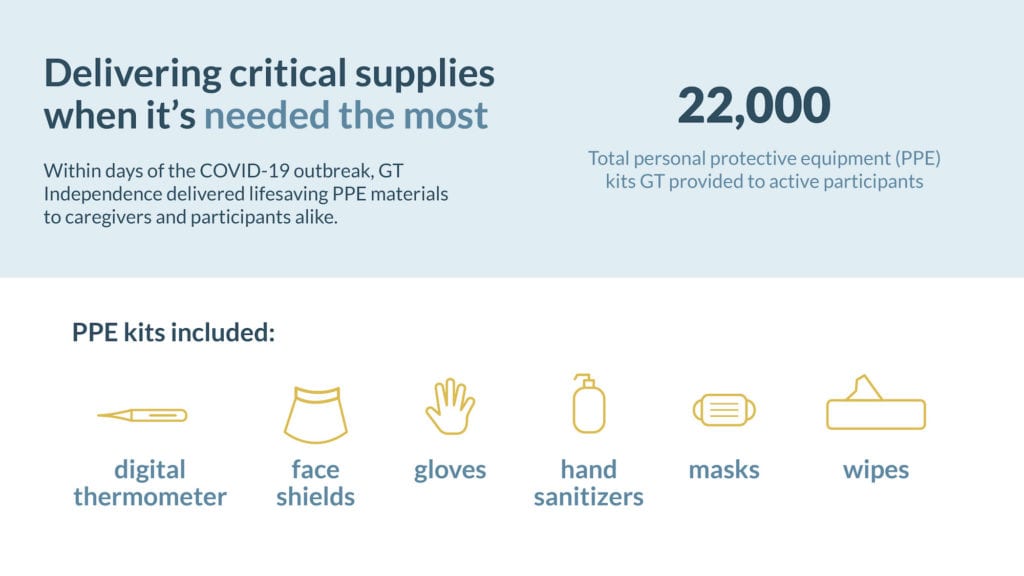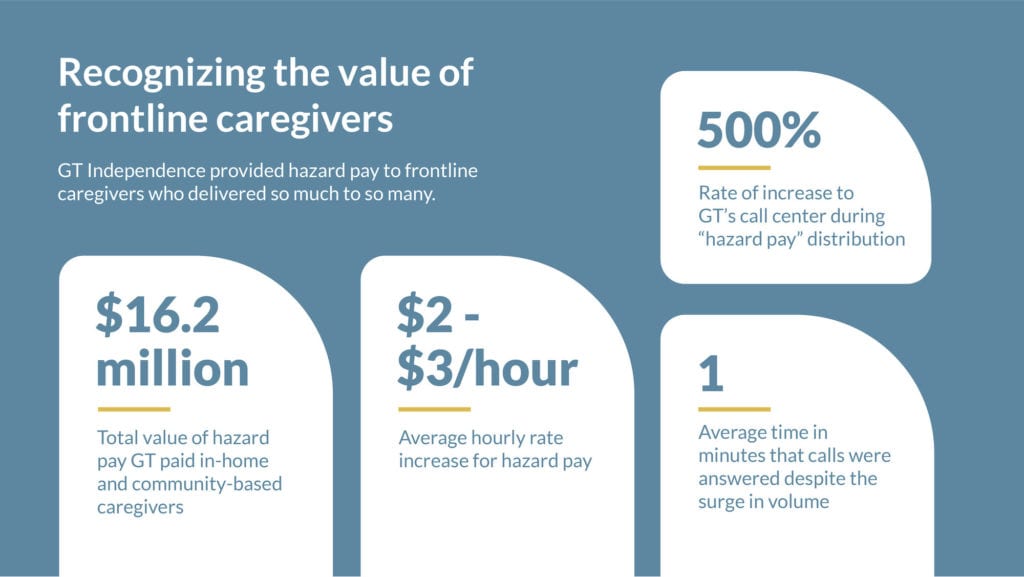April 26, 2021
Holly Carmichael, CEO
GT Independence is more than a financial management services (FMS) or payroll company. We help people live the life of their choosing, no matter their age or ability. In helping people live where they want and surrounded by people they know and trust, we believe we can help improve their quality of life. At GT, this mission has been a constant since our founding and continues to this day.
As the magnitude of COVID-19 started to emerge early last year, GT quickly adapted, prioritizing the people we serve and the people who make GT possible. We rapidly and seamlessly transitioned our employees to working safely from home, and for those caregivers in the field, we quickly supplied “essential employee” cards. This allowed us to continue providing the same quality service our clients had become accustomed to at a time when they needed it the most.
Soon after, we began delivering critical supplies in the form of personal protective equipment (PPE) to those requiring care and financial benefits including hazard pay and paid sick leave to those delivering care. It was simply the right thing to do for these participants and caregivers alike.
1. Distributing PPE
PPE was in high demand and short supply during the pandemic, especially during the early days. For people with physical limitations or requiring long-term service or support, obtaining these basic protective supplies was especially challenging. At GT, we recognized that the people we serve needed assistance protecting themselves as they were more likely at risk. And with a fast-moving virus circulating, time was of the essence.
We sent all active GT participants a PPE kit—containing four types of masks plus disinfecting wipes, hand sanitizer, gloves, and digital thermometers—all at no cost to them. In total, we distributed 22,000 PPE kits containing these items, helping these participants better protect themselves, their families, and the caregivers serving them.
Distributing PPE was a priority, and it helped showcase the efficiency and the safety of the home- and community-based services (HCBS) model that we strongly believe in. If FMS providers truly believe that HCBS is the best model of long-term service and support, then we should enable participants and their caregivers to maintain health and safety even in extraordinary times. We were fortunate to receive a $4 million imbursement through the federal government for our PPE distribution. GT navigated a cumbersome and complicated application process to do so, but any inconvenience was worth the effort and worth knowing our quick actions helped keep people safe.

2. Instituting Hazard Pay
Caregivers served on the frontlines in this pandemic and were part of the country’s most essential workers. For many, the health and safety protocols made their jobs more challenging as they cared for people under extreme stress and long work hours. Thanks to funding made possible through provisions passed in states where we do business, caregivers performing critical services and support received an additional “hazard pay” in their paychecks.
While the amount of hazard pay varied by state, each caregiver earned around an additional $2 to $3 per hour once their local legislation passed. At GT, we distributed more than $16.2 million in hazard pay to our network of in-home and community-based caregivers.

3. Providing Paid Sick Leave
Family caregivers typically don’t receive paid sick leave, but with the initial passage of the Families First Coronavirus Response Act (FFCRA), federal legislation created a win-win situation for participants and their employees or caregivers. The legislation made it possible for certain employers to provide paid sick leave to employees for pandemic-related reasons. Caregivers could take time off to attend to their (or a loved one’s) health, without experiencing the added worry of a missed paycheck. At the same time, the leave ensured that caregivers were not placing their employer at risk, by exposing participants to potentially dangerous viruses.
GT helped participants and caregivers work through FFCRA rules and requirements, providing education as well as assistance with the paperwork—and ultimately, providing relief. As of March 2021, GT has provided more than 7,500 days of paid sick time for caregivers in our network since the pandemic began. Plus, when participants needed someone to fill in for their caregiver on leave, our Caregiver Link gave them access to fully vetted and qualified caregivers ready to step in.
While the original FFCRA was set to expire at the end of 2020, extensions to the legislation have pushed the expiration to the end of September 2021. With the passage of the $1.9 trillion American Rescue Plan earlier this year, an important provision was added: any workers who had used up their paid sick leave under previous timeframes could reset on April 1 and use the time for additional purposes, including vaccination or recovery from associated side effects.
GT will continue to work with our participants and caregivers to ensure they understand the leave options available and can take steps to reduce their risk of contracting or spreading COVID-19.
Why It’s Important to Streamline Self-Direction Operations During COVID-19
Putting People First, Always
While no single person or company can resolve the pandemic, collectively we can make an important difference in people’s lives. In addition to helping people with PPE, hazard pay, and paid sick leave, GT directed support to people experiencing food insecurity and increased isolation—taking care of the whole person. With vaccination efforts well underway, we are also working with our network to encourage participation and ensure access according to local prioritization.
GT Independence is proud to have played a role in helping protect our participants and their caregivers—they have been and will continue to be our focus. Supporting people through life’s ups and downs is what we do, and we are grateful to be able to do so in times of their greatest needs. It is consistent with our values, and we’re fortunate to be able to do so.

From the desk of
